From Ayurvedic inheritance to artificial intelligence: Shahnaz Husain traces her entrepreneurial journey
Shahnaz Husain, who pioneered the herbal beauty care business in India, speaks to YSWeekender on how she began her career, how her products became an international brand, and why AI is relevant to the beauty business.
Shahnaz Husain needs no introduction. The Founder of Shahnaz Husain Group, she is credited with pioneering the herbal beauty care movement and taking India's herbal heritage to the world. And while beauty lies in the eye of the beholder, the veteran beauty expert believes that there’s a lot a person can do to enhance their beauty.

Shahnaz Husain
At 74, Shahnaz says that internal good health and external beauty go “hand in hand”, which is why she’s a stickler for beauty routines.
“I never miss this routine; it’s extremely important to be consistent. I use the same mask that we use in our salons. My night care routine is also extremely important to me. I have to remove makeup and get rid of the pollutants and grime that collect on the skin during the day. I use an aloe vera and lemon cleanser to remove eye makeup, and then nourish the skin with a cream containing wheat germ and carrot seed oil,” she says.
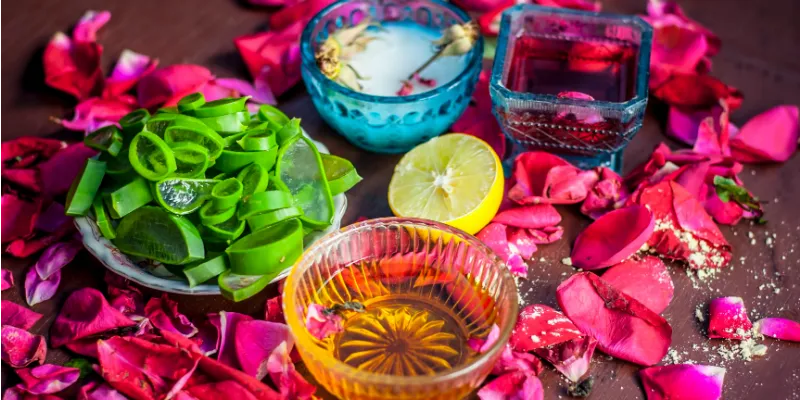
Aloe, lemon, rose and milk are known for their beautifying properties
Shahnaz Hussain’s daily routine also incorporates Pranayama to help her get rid of physical and mental fatigue. “I follow this up by performing some yoga. I find that it makes me feel relaxed and gives me a sense of well-being,” she says.
Started small, dreamt big
Shahnaz opened her first herbal clinic in 1971 and traces her roots to a royal family in Samarkand (modern day Uzbekistan).
Her Oxford-educated father, Chief Justice NU Beg, put her in an Irish convent (Queen Mary's in Allahabad), which instilled a love of poetry and English literature in her heart.
“I was married at the age of 15 and became a mother at 16. I was bored with the drudgery of endless routine. I loved beauty and so I went to leading beauty training schools in the West to learn cosmetology and cosmetic therapy,” she recalls.
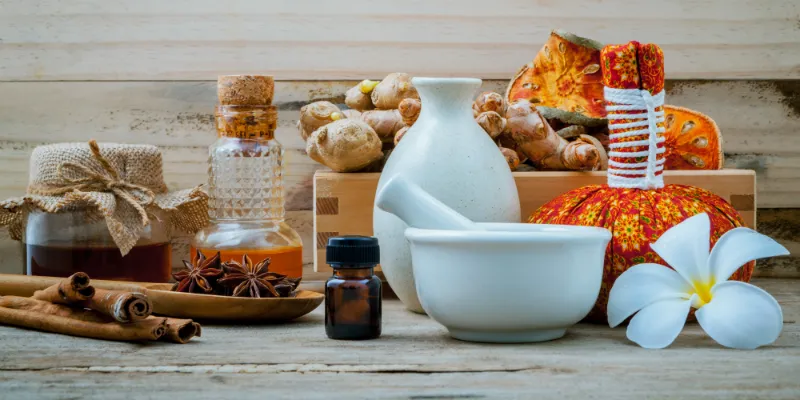
Ayurvedic products are now popular worldwide
Shahnaz explains that she started small, but always dreamt big. “I followed unique marketing and business strategies, like word of mouth and my franchise system, taking Ayurvedic beauty care worldwide with a crusader’s zeal. Today, after more than four decades, we have a global network of franchise salons, retail outlets, beauty training academies, and over 375 products for beauty and health care,” she says.
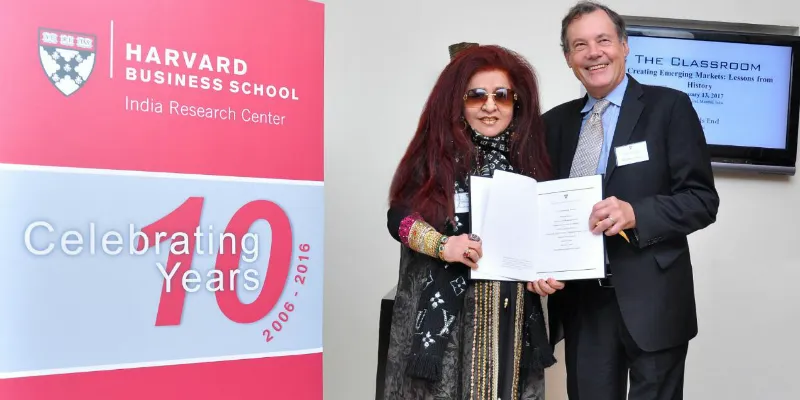
Shahnaz is now part of a Harvard case study for brand creation
Also read: ‘A web series allows us to tell stories with absolute freedom’: actor Dia Mirza
The Shahnaz Husain Group today operates in more than 175 countries, with franchise salons, retail outlets, and training academies.
The success of her brand has made her the subject of a Harvard case study.
Speaking about the honour, Shahnaz says:
“I was invited by Harvard Business School to speak on how I established an international brand without commercial advertisements. I became a Harvard case study for brand creation and am now part of a Harvard subject in Business History for Emerging Markets in recognition of the market for Ayurvedic beauty care created by me.”
Adapting to the digital world
Shahnaz has been treating skin and hair issues for more than four decades. The grand dame of herbal beauty still maintains this personal touch. But now she has a little help from artificial intelligence (AI), which is changing the way businesses operate.
Globally, AI is being used in many industries, including the beauty segment, by allowing brands to create more immersive and customised customer experiences. Companies like Estee Lauder and Sephora use it to enable users get customised beauty help with the click of a button, disrupting a market used to person-to-person contact and the “touch and feel” aspect.
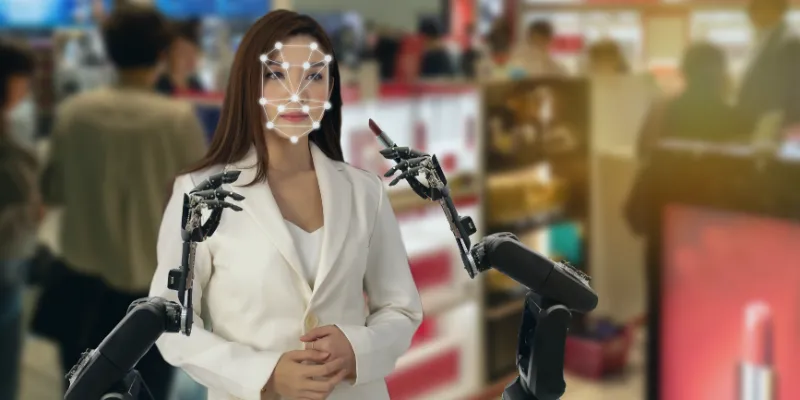
Artificial intelligence is being used extensively in the beauty industry
“Today, beauty brands can adopt Artificial Intelligence to create personalised products that are specifically tailored for customers. The customer can refer to the virtual card, fill in the details and search for a custom based product online. Thus, with the help of Artificial Intelligence, the customer may be able to find a skin profile that is totally personalised and unique, so much so that it may not fit another person,” she explains.
Machines will have to be programmed to take many other details and differences into account, like geographical region, climate, skin colour, ethnic backgrounds and so on.
She tells us, “It is now possible to manufacture a unique beauty product specifically meant for an individual, rather than conforming to a broad specification such as ‘skin type’. AI has made it possible to find a custom-made product for each individual. Location barriers are broken as well as I can have a look at someone sitting in Alaska and prescribe remedies. With technology, I can better understand my global customer’s needs from far away and offer personalised treatment.”
She adds, “From Ayurvedic inheritance to artificial intelligence, we have come a long way.”
Innovation in the product line
In the beauty business, the words herbal and organic are used interchangeably. “For the last four decades, I have focused my efforts on the benefits of organic ingredients and the harm caused by chemical ingredients. We formulate skin and hair care products according to the Ayurvedic system; they contain plant ingredients, essential oils, and natural substances,” she says. Shahnaz Husain products claim to be made without using parabens, sulfates, mineral oil and synthetic colours.
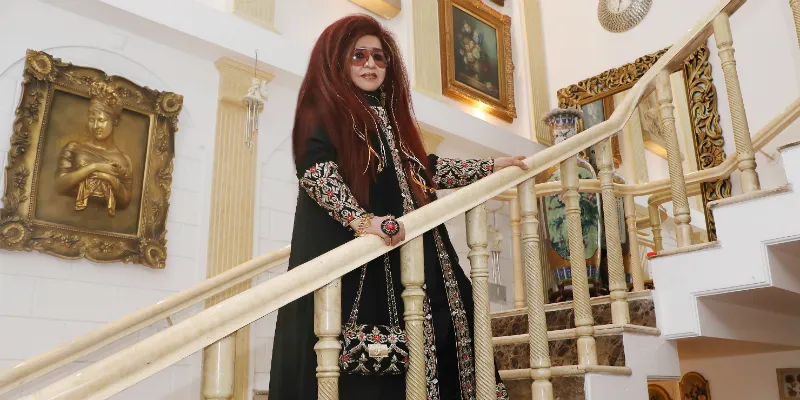
Shahnaz is known for her innovative beauty products
“We have been known for product innovation and have evolved more than 375 Ayurvedic products for beauty and health care. They are introduced after intensive research at our two R&D units. The products comprise formulations for general care and also include highly specialised therapeutic products for specific skin and hair problems. Our unique products include the Pearl, Diamond, Platinum, Plant Stem Cell and Flower Botanics ranges,” she says.
She also speaks about how her products are helping cancer patients who undergo chemotherapy, which leads to several side effects including hair loss and skin problems. The Shahnaz Husain Group have claimed to have sent Chemoline products free of cost to cancer hospitals, like Sloan Kettering, Rajiv Gandhi Cancer Institute and Research Centre, Dharamshila Cancer Hospital, MNJ Cancer Hospital, Tata Memorial etc.
“I also read an article that said cancer cases will surge over the next 25 years. This prompted me to start working with Ayurvedic ingredients to formulate products to deal with the effects of chemotherapy and radiation on skin and hair. I formulated the Chemoline range, which was launched in London. We give it free of cost to cancer hospitals as part of our CSR activities,” she says.
An eye on the future
In the future, her company plans to include concentrated international branding and will appoint distributors in new markets. Currently, the Shahnaz Husain Group exports to countries around the world, including those in the EU, UAE, UK, US and many other countries in the Asian and African sub-continents.
“We will continue to extend our franchise business, in India and abroad, setting up salons, spas, beauty training academies, and retail outlets based,” Shahnaz says.







